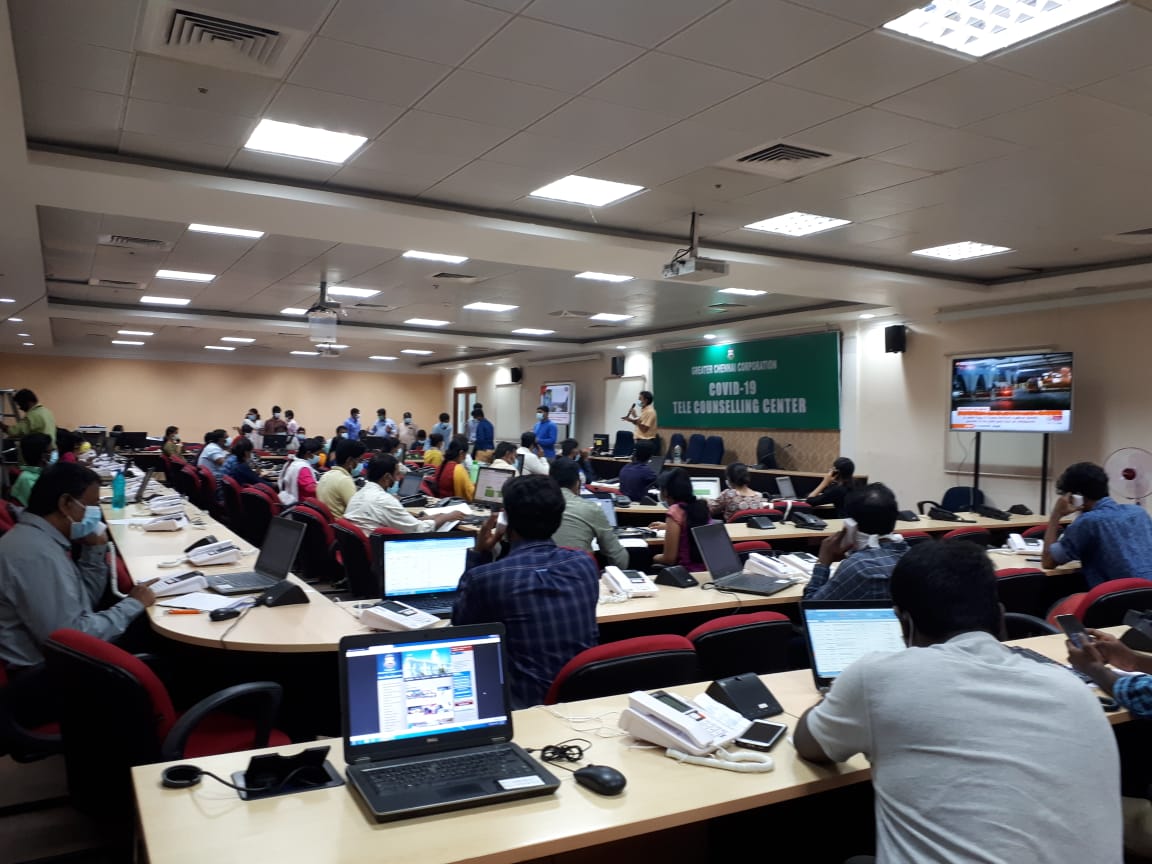
Telecounselors allay fears, become shoulder to cry on in times of COVID-19
A couple of weeks ago, Vijay (name changed), a resident of Perambur, was surprised to receive a call from the Chennai corporation’s COVID-19 telecounselling centre. The caller introduced herself as a counsellor and wanted to look him up and his family, as his grandfather had tested positive for COVID-19.

A couple of weeks ago, Vijay (name changed), a resident of Perambur, was surprised to receive a call from the Chennai corporation’s COVID-19 telecounselling centre. The caller introduced herself as a counsellor and wanted to look him up and his family, as his grandfather had tested positive for COVID-19.
Vijay said that initially he was annoyed by the call and snapped at the caller saying he wanted to be left alone. However, a couple of days later, he began appreciating the concern and patience the caller demonstrated.
“The same week, my wife too tested positive and I was quite stressed and anxious. Since I live with my aging parents, I was worried about them as well. The caller listened to my fears about my parents getting infected and since we already were being tested, assured me that even if they tested positive, they would receive good care,” he said.
A resident of Adyar, Susheela (name changed) recounted how the chats with the counsellors gave her respite, as she was missing her children and husband who were in a different city.
She said, “I landed in Chennai at my parent’s place, from the UAE in March third week and my husband and children were in Salem. They were supposed to join me, but couldn’t. In quarantine, I vented out my anguish and sadness to the callers, who called everyday, and they understood and consoled me. After the first few days, I began relaxing and was more at peace with the sudden change.”
The telecounselling centre which is a joint effort by the Greater Chennai corporation and the Loyola College has been operating since March.
The centre is a coordinated effort between counsellors social workers and psychologists —60 of them — alongside public health managers (those who direct the incoming calls to the person concerned in the team), doctors, engineers and city administrators along with the police. The idea of the centre is to provide psychosocial support.
Related news: Tele counselling center in Chennai checks on home quarantined
While it aims to reach out to all those requiring psychological help, the centre also links city residents with various other stakeholders in the civic body to take care of delivery of food, medicine and groceries and arrangement of 108 ambulance service.
Till date, they have made a total of 80,000 calls with an average of 3000 outgoing and 300 incoming calls every day.
Earlier, while the centre focused on quarantine cases, these telecounselling centres began making calls to the patients and their families to assess the support requirements.
Mercy Pious, a psychologist at the centre, explained the extent of anxiety COVID-19 has caused in people and said, “Invariably, when they are told that they have tested positive, there is disbelief, denial and they refuse to cooperate. Their caregivers too are under immense stress. We also see that the disease comes with a lot of stigma. One of the family members of a patient in the city told me that they have been called people from the ‘corona veedu’ (corona house). She even wondered how her children were going to deal with such taunts.”
She added that in such cases, counselling becomes a collaboration, with the sanitary inspector at the civic body being alerted about the case.
“The inspector then sensitised the people in the locality to alleviate their fears and concerns about COVID-19 patients,” she said.
From mothers who have been separated from their kids as they are under quarantine to new mothers who dread breastfeeding their newborns due to fear of passing on infections, Mercy listed out an array of challenging and difficult situations.
“We had to tell them that they won’t harm the baby in any way and that feeding is of utmost importance, as we guided them about using an overcoat and a mask while feeding the baby,” she said.
Despite being admonished and receiving rude remarks for the calls on daily basis, the counsellors maintain that rebuffs and verbal attacks are not as challenging as being too sympathetic is.
Kaleeswaran K., another counsellor and psychotherapist in the team, said, “We have to substitute sympathy with empathy, as people can be inconsolable or completely broken when they call up. The biggest lesson for us is never to get attached to their problems because that can hinder the process of finding solutions for them.”
However, the heart breaking moments have been too many, he added.
“One person who tested positive told us that COVID-19 is the new AIDS. He was referring to the stigma and discrimination he and his family have been facing. Some of them even express guilt for making the area they live in a containment zone,” he said.
Appreciating their efforts, the residents also said that there can to be better coordination between the councellors. Bharani (name changed) whose grandparents had tested positive said, “In the first few days, I got a host of calls from a number of government department including the police and they were asking the same set of questions.”
(Call helpline: 044-46122300 for any queries or help related to COVID-19)


